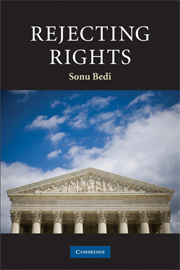Book contents
1 - The classic conception of rights: the “democratic deficit”
Published online by Cambridge University Press: 01 July 2009
Summary
How should we limit democratic government? Assuming we care about the competing values of liberty and democracy, what is the best regulatory principle for balancing them? Obviously, with no constraint on democratic government, there is nothing to thwart democratic tyranny. There is nothing to stop the polity from passing conventional sodomy laws or laws mandating racial segregation. We must limit democracy to some extent in order to ensure liberty. Alternatively, specifying all or even most of our normative obligations prior to any democratic decision-making may ensure liberty but leaves no place for democracy. We must be careful, then, not to go too far in limiting democracy. The puzzle is not whether or not to limit state power but how to do so. Consequently, I am not concerned with the following questions: Why should we limit democratic government? How do we arrive at such limits? How do we substantiate them? What are their foundations? Why do we even care about liberty and democracy? My book seeks only to answer “how”: How do we limit government so as to ensure liberty but simultaneously allow for and permit a good deal of democratic discretion?
The conventional answer employs rights to balance and realize the values of liberty and democracy. I do not interrogate the philosophical foundation of rights. Mine is an argument in political and legal theory not morality. It is an argument of application.
- Type
- Chapter
- Information
- Rejecting Rights , pp. 13 - 23Publisher: Cambridge University PressPrint publication year: 2009

